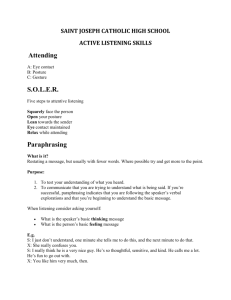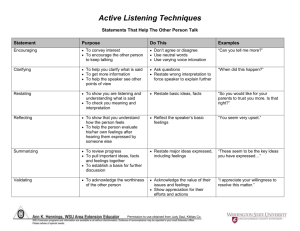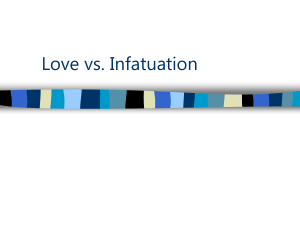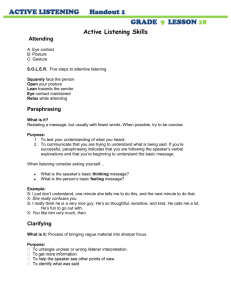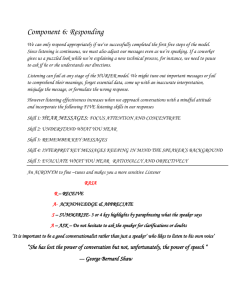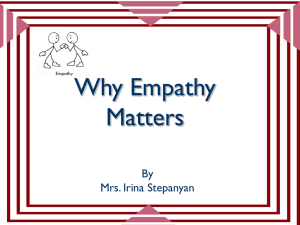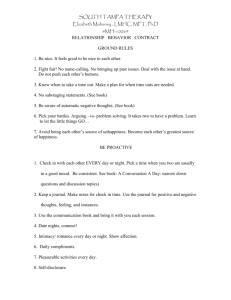Articles__Self_Help_files/couples 2.0 communication doc
advertisement
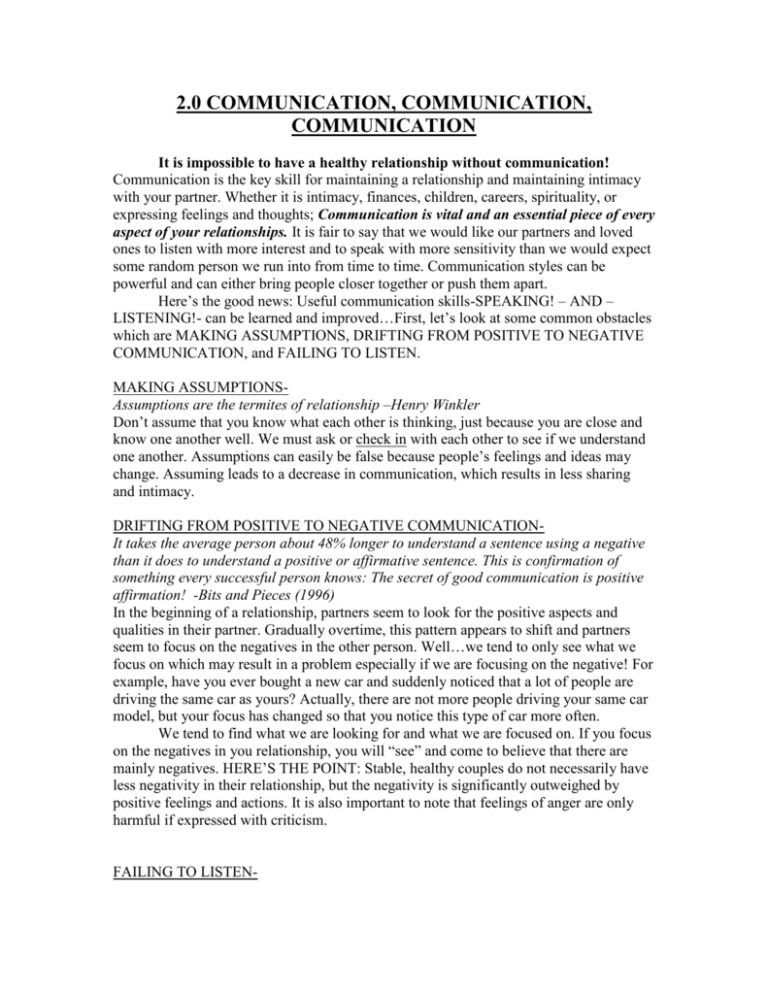
2.0 COMMUNICATION, COMMUNICATION, COMMUNICATION It is impossible to have a healthy relationship without communication! Communication is the key skill for maintaining a relationship and maintaining intimacy with your partner. Whether it is intimacy, finances, children, careers, spirituality, or expressing feelings and thoughts; Communication is vital and an essential piece of every aspect of your relationships. It is fair to say that we would like our partners and loved ones to listen with more interest and to speak with more sensitivity than we would expect some random person we run into from time to time. Communication styles can be powerful and can either bring people closer together or push them apart. Here’s the good news: Useful communication skills-SPEAKING! – AND – LISTENING!- can be learned and improved…First, let’s look at some common obstacles which are MAKING ASSUMPTIONS, DRIFTING FROM POSITIVE TO NEGATIVE COMMUNICATION, and FAILING TO LISTEN. MAKING ASSUMPTIONSAssumptions are the termites of relationship –Henry Winkler Don’t assume that you know what each other is thinking, just because you are close and know one another well. We must ask or check in with each other to see if we understand one another. Assumptions can easily be false because people’s feelings and ideas may change. Assuming leads to a decrease in communication, which results in less sharing and intimacy. DRIFTING FROM POSITIVE TO NEGATIVE COMMUNICATIONIt takes the average person about 48% longer to understand a sentence using a negative than it does to understand a positive or affirmative sentence. This is confirmation of something every successful person knows: The secret of good communication is positive affirmation! -Bits and Pieces (1996) In the beginning of a relationship, partners seem to look for the positive aspects and qualities in their partner. Gradually overtime, this pattern appears to shift and partners seem to focus on the negatives in the other person. Well…we tend to only see what we focus on which may result in a problem especially if we are focusing on the negative! For example, have you ever bought a new car and suddenly noticed that a lot of people are driving the same car as yours? Actually, there are not more people driving your same car model, but your focus has changed so that you notice this type of car more often. We tend to find what we are looking for and what we are focused on. If you focus on the negatives in you relationship, you will “see” and come to believe that there are mainly negatives. HERE’S THE POINT: Stable, healthy couples do not necessarily have less negativity in their relationship, but the negativity is significantly outweighed by positive feelings and actions. It is also important to note that feelings of anger are only harmful if expressed with criticism. FAILING TO LISTEN- We were born with TWO ears and ONE mouth. That ought to tell us something! –Bits and Pieces (1997) The #1 communication skill that is considered paramount for developing and maintaining intimacy and relationships, it is LISTENING! We can hear someone talking without actually listening to what they are saying. Good listening skills= Patience, not judging, and spending energy trying to understand. In order to relate effectively with ANYONE, you must learn to listen. This means…you should not be planning your next response or deciding whether you agree or disagree- YOU MUST SIMPLY LISTEN! This is important because, if you listen while holding firmly to your own perspective, you will only selectively hear what fits into your own view. In that case, what you call agreement with someone is based not on what you currently hear, but on what fits into your pre-existing beliefs. To really listen involves withholding your own beliefs so you do not listen defensively. Of course, your own feelings and beliefs are important but they can get in the way of LISTENING. Your inner thoughts may send you messages based on what the speaker says, such as “that hurts”, I am not letting her get away with this”, or “that is wrong”. These judgments will interfere with your ability to really understand the speaker. How do we minimize this defensiveness and judgment? By paraphrasing. PARAPHRASING is a very, very important skill to learn and use often! Paraphrasing has two parts: 1) Restate the speaker’s idea or content. 2) Describe the speaker’s idea using feeling. Although this approach slows down communication, it minimizes misunderstanding and conflict. Here is an example: Sue: “I am really fed up with these kids!” Mike (restating the idea #1): “Sounds like the kids are acting out.” Mike (focusing on feeling #2): “You really seem frustrated, and it sounds like you need time away from the kids.” By restating the content and focusing on the feelings, the speaker ends up feeling understood and appreciated! What is your communication style? (see pg. 29-31 in the Empowering Couples book) Passive- Unwillingness to honestly share thoughts, feelings, or desires. May stem from low self esteem and used to avoid hurting the other person’s feelings, or to avoid being criticized. The other partner may be left feeling angry, mistrustful, or confused. Aggressive- Blaming or accusing the other person. Accompanied language may be “you always” or “you never”. The focus is on the negative characteristics of the person rather than the situation. Assertive- Allows each person to express themselves in a non-defensive, healthy way. It is asking clearly and directly for what one wants, and being respectful and positive. In conclusion, some suggestions for improving you communication include: 1) Focus on the good in each other. 2) Praise and compliment each other often. 3) Take time to listen. Listen to understand, not judge. After listening, tell your partner what you heard (content and feeling) BEFORE you share your own ideas. 4) Be assertive. (Using “I” statements rather than “YOU” statements) Let your partner know what you mean- don’t let your needs become a guessing game. 5) Give your relationship importance and the attention you did when you first met.

